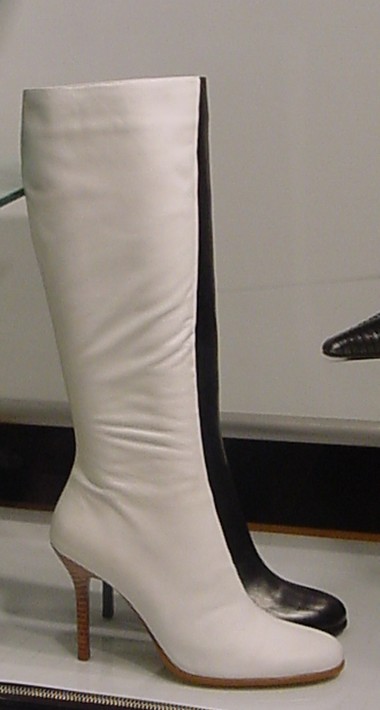


The iPod lets a user create playlists with the rich user interface of one's home computer in conjunction with the convenience of a very light music player. In the same way, one might use a lifestyle management application to set large and small goals that could be tracked and supported using a mobile device, perhaps a cell-phone or PDA.
People are justifiably worried about the ways in which governments and corporations
gather and use their personal data.
I propose a federal Ministry of Information which would be
the only entity allowed to store certain kinds of information about people.
All other entities having a legitimate need to use this information
would have to sign out people's records temporarily, then destroy any local copies when
the transaction completed.
The state has a legitimate need to keep information about people.
Centralizing that information makes a professional, responsible approach possible.
Where individuals are suspected of having committed a crime, information about the
investigation would be entered in their file. Once a file is started, there is a limit
on how long it can remain private from the individual under investigation,
Medical records are an obvious first step; it's to people's advantage that these be
centralized and that corporations be prevented from inappropriately accessing them.
It's fun to think about the kinds of machines that could be created with
the forthcoming Cell processor from IBM / Sony / Toshiba.
A complete family-room entertainment solution is the most obvious application,
crossing the set-top box with the Playstation and the Macintosh.
The OS X functionality could give the user sophisticated access to their movie and
music libraries, as well as running DJ software.
Once this sort of box has been around for a while, the dreams of
the early proponents of Bluetooth might begin to come true:
heating, ventilation and air conditioning control,
power management responding to price signals from the local utility,
home security.
The Rebel Sell is thought provoking and a good read.
It encourages people concerned about the state of the world or the evil
done by large corporations to solve these problems in traditional ways:
conventional political activism is effective, if time consuming,
whereas "culture-jamming" distracts from the serious work at hand.
In particular, the authors argue that the best way to
rein in multinational corporations is workplace and environmental regulations
enforced through international agreements and supranational bodies.
In the process of making this argument, the authors observe that
as a developing society becomes wealthier its citizens become increasingly happy until
they reach about US$10,000 per head, after which no further happiness gains are seen, no
matter how much extra GNP is added.
The authors argue that once people's basic food, shelter and medical needs are met,
people's happiness depends on their status within a society. As the proportion of high-status
individuals remains constant, a rise in average income has no effect on people's happiness.
This is at odds with my experience, which includes both low-status happy people and
unhappy high-status people.
Happiness is more a result of being secure and respected in one's role than in having a
high-status role.
Predictably, my thoughts turn to ways in which our environment might be
augmented to create greater happiness. If happiness is truly dependent on being near
the top of a social hierarchy, why not create a dreamorld (like Everquest) in which
humans can lord it over legions of computer-generated minions?
The Mac Mini could be an attractive purchase in a number of roles.
- As a conventional desktop computer,
the Mini is cost-competitive with low-end Windows boxes, and
I suspect it will encourage a few people to switch.
More households are likely to pick one up as a second computer,
perhaps giving it to one of the children for schoolwork and websurfing
while keeping an existing Windows box.
- There's probably a wave of pent-up demand from Mac owners wanting to upgrade or
get a second machine, but unable to justify Apple's hitherto high prices.
- I've read articles suggesting that the mini could be used as a little server in
low-bandwidth applications, and that it could be used as a cheap cluster node.
Here the main competition is Linux.
In this role it will likely do well where sysadmins are interested in ease-of-use,
e.g. in schools or non-tech businesses.
- Most of the speculative articles I've seen (Cringely, etc)
are interested in the Mini as a home entertainment server, organizing one's movie and music
collections and managing access to on-line movie and music providers.
A Mini running iLife is very competitive with the HP media center which costs three
times as much, and would look better in the living room.
Although Apple usually drops the price of a new machine within six months of its
introduction, I think in this case they'll choose to add features instead.
Apple may not want to let the price of their computers drop too low,
as this could compromise the status associated with their brand.
The Mini's base configuration has too little memory,
so this will likely be the first thing Apple adds.
512 Mb would be fine, and power users might still upgrade to 768 Mb.
Larger and faster hard drives would be an advantage in a media server.
A large Firewire hard drive would be an attractive companion purchase; look for
style-matched drives that stack with the Mini.
The Mini will create a market for both hardware and software add-ons,
much like the iPod ecosystem,
with a focus on devices to help the mini interoperate with home theatre and sound components.
Bluetooth might come into its own here. For instance, a remote control for movies and
stereo functions that's backlit and simple enough to operate in the dark.
I used Google to discover that the Val Kilmer graffiti on Queen West is advertising for a local band. I had hoped the Kilmer tags were semiotically subtle: perhaps a commentary on the meaninglessness of celebrity (what does 'Val Kilmer' mean as an assertion?), or perhaps his fame was being used to sell the message 'nothing', thus calling into question the mechanism by which stardom is used in advertising. But no, the tags are just ads for a band called 'Val Kilmer'.
I recently read an article about the awfulness of old folks' homes,
which are dull places to live.
The inmates are often angry or frustrated at their declining abilities,
and many have Alzheimers' disease.
It strikes me that a more interesting environment could be created by dramatizing the
negative emotional energy inherent in many retirees' lives.
In people of high-school age, feelings of powerlessness, alienation, guilt and sexual
confusion often find outlets in the creation of Punk or Goth personae.
One explores the negative forces in one's life through clothes, music
and other dramatizations of angst.
Earlier this year I read a
screed arguing that
as fossil fuels will eventually run out, civilization as we know it must
come to an abrupt and violent end.
My initial response had been to argue that we would have to shift to more expensive,
less concentrated energy sources, but that on the whole our civilization would survive.
Having recently read about
algae biodiesel,
I'm no longer worried about running out of fuel; if anything, cars are likely to become
cheaper to operate over the next fifty years, although there may be a period of
fuel scarcity. Note: for an interesting overview of all the alternatives, see F. David Doty's
Future Fuels.pdf.
Although it's couched as an argument that the hydogen economy will never materialize, it
surveys many energy alternatives.
One can argue that algae biodiesel comes too late to save us, or that the algae will be
susceptible to disease, or that it'll cost too much to build the necessary refineries.
I'm optimistic that these problems will be solved. Yet even if it were possible to
prove that all these difficulties are surmountable, the article's author still believes
that we're doomed:
|
The development of a "free energy" device would just put off the inevitable. The Earth has a carrying capacity. If we are able to substitute a significant portion of our fossil fuel usage with "free energy", the crash would just come at a later time, when we have depleted a different resource. At that point, our population will be even higher. The higher a population is, the further it has to fall when it depletes a key resource. The further it has to fall, the more momentum it picks up on the way down through war and disease. By encouraging continued population growth, so-called "free energy" could actually make our situation worse. |
It's been recognized for a long time that music and mathematics are complementary interests, in the sense that musicians often have an aptitude for mathematics, and mathematicians are more often than not interested in music.
Over the years I've noticed that geek culture also overlaps with a number of other interests: mathematics, of course, and music (formal styles - not grunge or punk), and also goth, fantasy role-playing gaming, rock climbing and to some extent woodworking.
Back when I was going to the local goth clubs regularly, I noticed that many of the people there were also tech industry workers, and usually one or two of my co-workers have been at least mildly gothic wherever I've worked. The programmers were usually the more formal, "minor nobility of the undead" goths, not the dark punks or death metal folk who often come to the same bars. A large part of Goth is music: dark, overwrought and romantic but orderly and formal.
The fantasy-role playing connection with geekiness is easy to understand, based as it is on arcane technical detail, and a comforting sense that the world (as we create it) has rules and order. Enthusiasm for games like Chess and Diplomacy is also common.
Lots of rock climbers are programmers and lots of programmers rock-climb.
The geek-woodworking nexus moves off in a completely different direction from goth or gaming. For one thing it's less social, although there are still the creation, order, and technical detail angles. I've often met programmers who were interested in woodworking, even if they hadn't been able to get a woodshop together.
Currently, Linux has a mindshare far outstripping its actual market share as a consumer operating system. It is encouraging to see European and developing world governments adopting it for use in their ministries, but one also sees stories of marketplaces where you can pick up the latest Windows software for $3 or less. This is possible because of economies of scale: the man in the street wants to use Windows because it's relatively easy to use, has lots of device drivers, consumer applications and games.
Ease of use: sure, once Windows is installed it's going to crash regularly, have to be reinstalled often and cause regular user frustration - it remains an effective piece of Software Theatre because it appears much easier to use than any UNIX variant. In UNIX, once you know how to express your wishes you can do exactly what you want - IF the desired program exists and you can find it, and wade through, and grok, the documentation; which is frequently difficult.
So then. If I had a billion dollars and I wanted to establish Linux as the dominant Consumer OS, how would I proceed? IBM's presence legitimizes Linux on the business side, but how do you morph that into attractiveness to the masses?
The first step is to make the same sort of hard decisions in the UI layer that Linus Torvalds makes daily in the Kernel. The Linux kernel is robust and hasn't forked because Torvalds imposes his vision on it. His hierarchy of committers select and promote functionality that fits with his unifying vision. Usually, a feature can be packaged in such a way that it fits into the overarching scheme. He's also good at fostering the sort of compromise that can't be made without an honest broker.
I'd begin by tossing X-Windows, which is often spoken of as holding back GUI development, and selecting a graphics system compatible with the next twenty years. There must be lots of little open source projects out there languishing for lack of attention. Choose two or three, employ their more brilliant developers, get them in a room and force them to combine the more attractive parts of their systems into a single new open source project.
I'd concurrently be doing the same thing for device drivers and the GUI interfaces that configure them, printing, location management, typesetting, multimedia, and all the other aspects of a modern consumer operating system: identify the best academic and open-source projects, force them to meld, and release the result not only as a series of open source projects, but as a single installable binary OS on two or three CD's. Most of the decisions about what to install would already have been made by the time the user got their hands on the package, which would include attractive manuals.
Given a real framework, the open source community is capable of creating useful things. It's making the hard architectural decisions that has historically proven difficult for OSS developers.
This all sounds a lot like OS X. Apple has shown the way by taking UNIX and imposing Steve Jobs's will on it, but it remains a relatively costly, closed-source solution running on proprietary hardware that is never going to have a lot of penetration in the developing world.
I enjoy working in Mac OS X, but it would be nice to be able to reach a large audience while working within an open source system.
So far, Moore's law is still holding: every eighteen months, microprocessors become twice as powerful. A corollary is that over time it becomes cheaper to make a processor of any given power.
Kristin and I are hoping to buy a house in the next couple of years.
What with our outdoor hobby equipment and lots of ancestral furniture,
our possessions barely fit into a large apartment, so finding a decent-sized
house is a priority.
We're hoping to find a fixer-upper and spend the next few years renovating it.
House prices are currently rising fast here in Toronto, as they are in many
other big cities.
However, a recent Economist
article
makes the following arguments that house prices can't keep rising forever:
Over the past three years, I've been annoyed by an almost-universal trend toward ugliness in women's footwear. This design failure is especially aggravating because the last years of the twentieth century produced a wide variety of attractive foot fashions that have since disappeared. On a recent stroll I was encouraged to notice what may be the first sign of a revival.
 |
 |
 |
There are many shades of ugly: note the elongated toes, sometimes pointy and sometimes spade-like, but never human. Another awkward trend (just visible in the picture at the far right) has been to pull the heel as far to the back of the shoe as possible. Sometimes the heel is also widened into a wall, which just looks odd.
 |
 |
Archaeologists will be able to date boots from 2003 by checking for sneaker-styling. This was amusing when one or two manufacturers were doing it; it's just bizarre now that everyone has a sneaker line. (Although I have to admit there are some attractive sneaker boots out there.)
 |
 |
This is a hopeful sign: note the attractive, feminine curves. The toe could still be a bit shorter, the indent above the heel less abrupt, the ankle narrower and the stilletto more interestingly shaped, but on the whole a promise of good things to come.